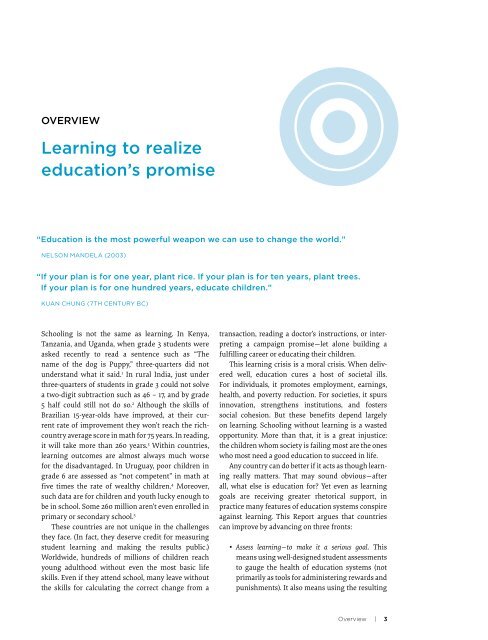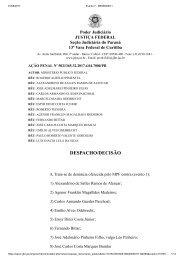Brasil só deve dominar Leitura em 260 anos, aponta estudo do Banco Mundial Relatorio Banco Mundial _Learning
Create successful ePaper yourself
Turn your PDF publications into a flip-book with our unique Google optimized e-Paper software.
OVERVIEW<br />
<strong>Learning</strong> to realize<br />
education’s promise<br />
“Education is the most powerful weapon we can use to change the world.”<br />
NELSON MANDELA (2003)<br />
“ If your plan is for one year, plant rice. If your plan is for ten years, plant trees.<br />
If your plan is for one hundred years, educate children.”<br />
KUAN CHUNG (7TH CENTURY BC)<br />
Schooling is not the same as learning. In Kenya,<br />
Tanzania, and Uganda, when grade 3 students were<br />
asked recently to read a sentence such as “The<br />
name of the <strong>do</strong>g is Puppy,” three-quarters did not<br />
understand what it said. 1 In rural India, just under<br />
three-quarters of students in grade 3 could not solve<br />
a two-digit subtraction such as 46 – 17, and by grade<br />
5 half could still not <strong>do</strong> so. 2 Although the skills of<br />
Brazilian 15-year-olds have improved, at their current<br />
rate of improv<strong>em</strong>ent they won’t reach the richcountry<br />
average score in math for 75 years. In reading,<br />
it will take more than <strong>260</strong> years. 3 Within countries,<br />
learning outcomes are almost always much worse<br />
for the disadvantaged. In Uruguay, poor children in<br />
grade 6 are assessed as “not competent” in math at<br />
five times the rate of wealthy children. 4 Moreover,<br />
such data are for children and youth lucky enough to<br />
be in school. Some <strong>260</strong> million aren’t even enrolled in<br />
primary or secondary school. 5<br />
These countries are not unique in the challenges<br />
they face. (In fact, they deserve credit for measuring<br />
student learning and making the results public.)<br />
Worldwide, hundreds of millions of children reach<br />
young adulthood without even the most basic life<br />
skills. Even if they attend school, many leave without<br />
the skills for calculating the correct change from a<br />
transaction, reading a <strong>do</strong>ctor’s instructions, or interpreting<br />
a campaign promise—let alone building a<br />
fulfilling career or educating their children.<br />
This learning crisis is a moral crisis. When delivered<br />
well, education cures a host of societal ills.<br />
For individuals, it promotes <strong>em</strong>ployment, earnings,<br />
health, and poverty reduction. For societies, it spurs<br />
innovation, strengthens institutions, and fosters<br />
social cohesion. But these benefits depend largely<br />
on learning. Schooling without learning is a wasted<br />
opportunity. More than that, it is a great injustice:<br />
the children whom society is failing most are the ones<br />
who most need a good education to succeed in life.<br />
Any country can <strong>do</strong> better if it acts as though learning<br />
really matters. That may sound obvious—after<br />
all, what else is education for? Yet even as learning<br />
goals are receiving greater rhetorical support, in<br />
practice many features of education syst<strong>em</strong>s conspire<br />
against learning. This Report argues that countries<br />
can improve by advancing on three fronts:<br />
• Assess learning—to make it a serious goal. This<br />
means using well-designed student assessments<br />
to gauge the health of education syst<strong>em</strong>s (not<br />
primarily as tools for administering rewards and<br />
punishments). It also means using the resulting<br />
Overview | 3








